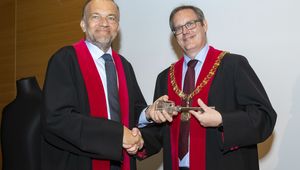Introducing the JKU Vice Rectors
Mag. Christiane Tusek is the JKU Vice-Rector for Finance and Entrepreneurship. We spoke with her about her responsibilities and future plans.

We are living in times of rapid inflation and increasing energy costs. How does this impact the JKU?
Christiane Tusek: The situation is indeed precarious. In short, our expenses are higher than our government-approved budget can compensate for. As a result, the upcoming budget negotiations will be particularly important. Given the high rate of inflation, we cannot compare current challenges to past challenges; however, we will, of course, do everything we can to ensure that the JKU is in a position to meet these challenges. And we are not alone: together with uniko, we are working towards fair funding.
Under these conditions, is it difficult to distribute the available funding fairly between the various areas? Is this even possible?
Christiane Tusek: Like the other universities, the JKU is a social focal point, giving it a higher level of responsibility. Naturally, under these circumstances combined with the current market environment, using the funds in the right way is even more challenging. The allocation of funds can sometimes generate a feeling of being unfairly treated. I would like to make it quite clear, however, that distributing budget funds fairly is a very personal concern of mine.
I do not make these decisions on my own, however. The Rectorate works as a collegial body, meaning before any implementation, the Rector creates a strategic direction together with the Vice-Rectors. Funding is also allocated with regard to the overall strategy and by no means as a valuation of an institute’s or project’s academic/scientific significance.
How do you determine if an application is approved in a particular case?
Christiane Tusek: Naturally, this is not up to me. When it comes to research issues, for example, I consult with Vice-Rector Alberta Bonanni; and when it comes to administrative projects, I speak with Vice-Rector Alexander Freischlager. Or we discuss it together in the Rector's office. I am then responsible for the financial execution with regard to the decision.
Of course, you can't approve everything...
Christiane Tusek: No, and I am a staunch opponent of the watering-can principle. I deliberate on what will most benefit the JKU as a whole in the long term, and what will provide the best leverage. If we reject something, that doesn't mean it's not good, but just perhaps something else needs to be given priority at the moment.
You receive countless requests, but resources are limited. Why do you wish to be Vice-Rector for Finance at a time when the budgets are tight?
Christiane Tusek: Because this is precisely the time in which we can make a real difference, and this is where my decades of experience comes in. Understanding the economic context is important, along with applying it to the university’s structure. The goal is to facilitate growth and avoid adverse effects. It’s not easy at times - and we sometimes "flounder" but that’s okay as I'm a good swimmer!
You can't avoid letting people down, though. Is it difficult to not being able to give everyone everything they want?
Christiane Tusek: No, I can handle that. I'm very open - I like people and I like to listen. In the end however, I am responsible for plusses and minuses. Together with my amazing team, I do my best every day to pull the right levers so that the university can come out on top. I find it very exciting!
Can you give us a brief account of your first term of office?
Christiane Tusek: During my first term of office, I believe we all worked together well to benefit the JKU. We managed to master the challenges on account of the Coronavirus pandemic and implement important campus enhancement projects. I am also particularly proud of the € 640 million budget we negotiated with the federal government for the 2022-2024 performance agreement.
At the end of your term of office, what would the JKU have to become for you to say: Yes, it was all worth it?
Christiane Tusek: I firmly believe that any commitment made with dedication and heart and soul is worthwhile. I would be happy and proud if the JKU, as a driver of innovation and pace-setter, could continue significantly contributing to Upper Austria’s growth as a location of academia and business. I would also like to see more in the way of external funding as the sky is the limit in that regard.
The most important thing will be a strong conclusion to the performance agreement. If we can do that, I will be very content.
Regardless of whether it's a favorite spot or an insider's culinary tip - what stands out at the JKU for you?
Christiane Tusek: I don't have a particularly favorite place at the JKU. The whole campus is an experience for me and a very inspiring place to work, bursting with knowledge and intellectually curious people. However, Kuyo has the best coffee and I always enjoy my coffee there.
News

 Go to JKU Homepage
Go to JKU Homepage










